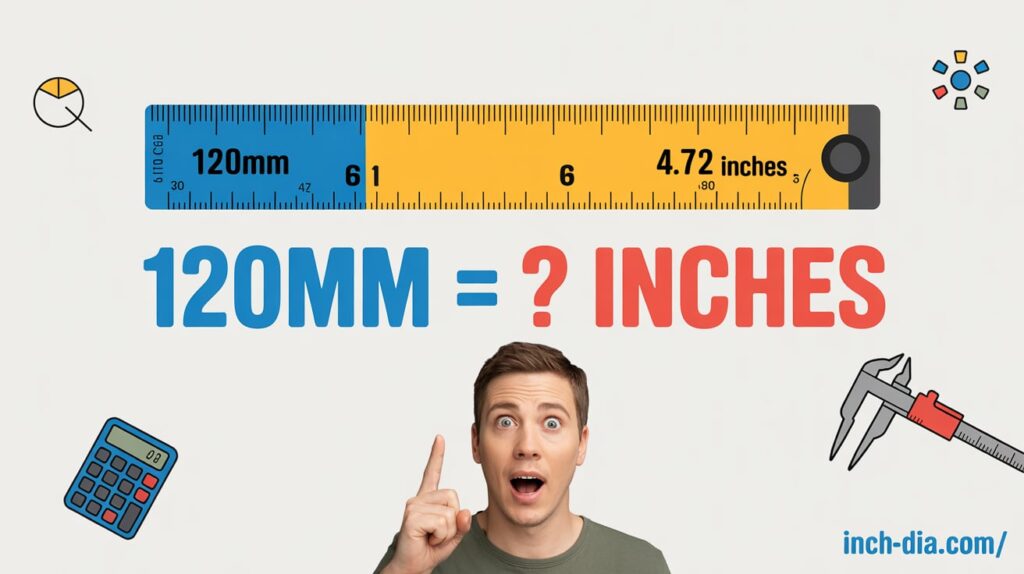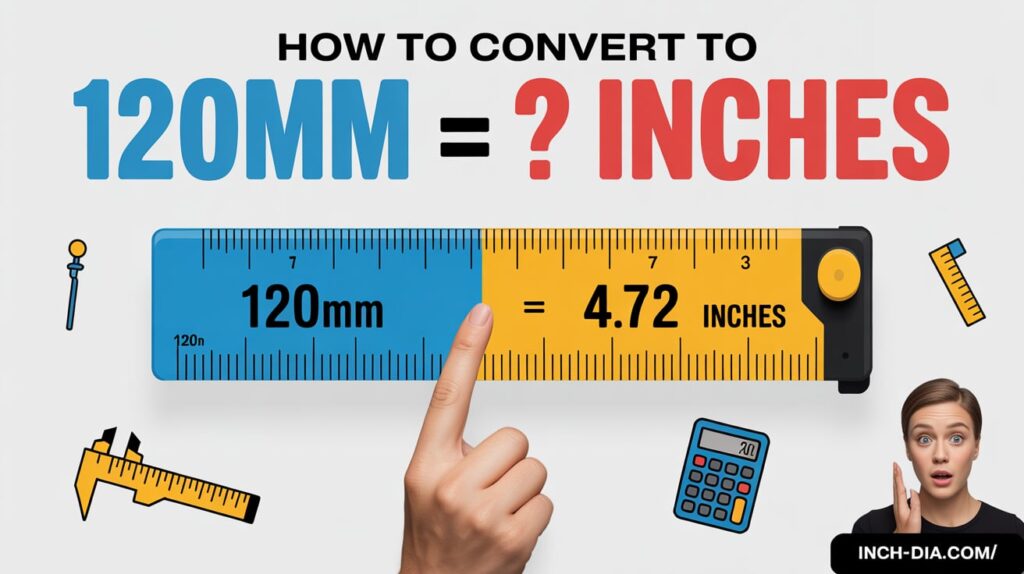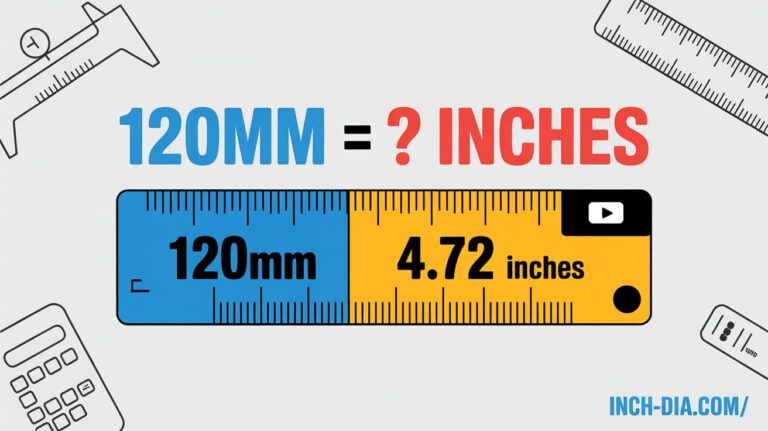Whether you’re a DIY enthusiast, an engineer, or simply someone shopping for furniture from an international retailer, knowing how to convert 120mm to inches is a valuable skill.
Measurements often come in different units depending on the country or industry, and bridging the gap between the metric and imperial systems can save you time, money, and frustration.
This comprehensive guide will walk you through the process of 120mm to inches conversion, explain the millimeter to inch formula, and provide practical tips to make converting metric measurements second nature. By the end, you’ll be confident performing easy mm to inches conversion for 120mm or any other value.
Introduction to Millimeters to Inches Conversion
The world uses two primary measurement systems: the metric system, which includes millimeters (mm), and the imperial system, which includes inches (in).
Understanding how to convert millimeters to inches is essential for anyone working across these systems. Let’s start by exploring the basics.

What Are Millimeters and Inches?
A millimeter is a unit of length in the metric system, equal to one-thousandth of a meter. It’s commonly used worldwide for precise measurements in fields like engineering, manufacturing, and science. For example, 120mm is a common dimension for items like camera lenses or small tools.
An inch, on the other hand, is a unit of length in the imperial system, primarily used in the United States, the United Kingdom, and a few other countries. One inch is exactly 25.4 millimeters. This relationship is the key to metric to imperial conversion.
Why Learn to Convert Millimeters to Inches?
Converting 120mm to inches is useful in many scenarios. For instance, if you’re ordering a part from a European supplier (using metric units) but your tools are calibrated in imperial units, you’ll need to calculate the equivalent in inches.
Similarly, international travel, shopping, or even academic projects may require you to change measurements between systems. Mastering measurement conversion ensures accuracy and compatibility.
The Importance of Metric System Conversion
The metric system conversion process, such as converting millimeters to inches, is critical in a globalized world. Misinterpreting measurements can lead to costly errors, like ordering the wrong size materials or misaligning parts in a project.
By learning how to transform 120mm into inches, you’re equipping yourself with a practical skill for both professional and personal tasks.
Understanding the Millimeter to Inch Formula
The foundation of the 120mm to inches conversion lies in a simple mathematical formula. Let’s break it down.
The Math Behind 120mm to Inches Conversion
To convert millimeters to inches, divide the number of millimeters by 25.4, since 1 inch equals 25.4 mm. For 120mm:
120 ÷ 25.4 = 4.724 inches
Alternatively, you can multiply the millimeter value by 0.0393701 (the reciprocal of 25.4). For 120mm:
120 × 0.0393701 = 4.724 inches
Both methods yield the same result, confirming that 120 millimeters to inches is approximately 4.724 inches.
Quick Reference: mm to Inches Calculator and Conversion Factor
If math isn’t your strong suit, don’t worry. You can use an mm to inches calculator for instant results or memorize the conversion factor:
- 1 mm = 0.0393701 in
- 1 in = 25.4 mm
This factor is the cornerstone of imperial unit conversion and will help you calculate 120mm to inches with ease.
How to Calculate 120mm in Inches
Let’s apply the formula to 120mm:
- Divide: 120 ÷ 25.4 = 4.724
- Or multiply: 120 × 0.0393701 = 4.724
The result, 4.724 inches, is precise and ready for use in any project requiring metric to imperial conversion.
Step-by-Step Process to Convert 120mm to Inches
For those who prefer a structured approach, here’s a 120mm to inches step-by-step guide to ensure accuracy.
Step 1: Memorize the Metric to Imperial Conversion Factor
Start by knowing that 1 mm equals 0.0393701 in, or equivalently, 1 in equals 25.4 mm. This is the key to all mm to inches conversion.
Step 2: Perform the 120mm to Inches Step-by-Step Calculation
Take 120mm and divide by 25.4:
120 ÷ 25.4 = 4.724 inches
Alternatively, multiply by 0.0393701:
120 × 0.0393701 = 4.724 inches
Both calculations confirm that 120mm in inches is 4.724.
Step 3: Double-Check Your 120 Millimeters to Inches Result
To avoid errors, verify your calculation using a calculator or an mm to inches conversion tool. You can also cross-check by converting back:
4.724 × 25.4 = 120mm
This step ensures your measurement conversion is accurate.

Real-World Applications of Converting Metric Measurements
Knowing how to convert 120mm to inches has practical applications across various fields. Let’s explore some examples.
120mm to Inches in Construction and Engineering
In construction and engineering, precise measurements are critical. A blueprint from a European firm might list dimensions in millimeters, while your tools or materials are in inches.
For instance, a 120mm pipe needs to be matched with an inch-based fitting. By converting 120mm to inches (4.724 in), you ensure compatibility and avoid costly mistakes.
Everyday Uses for Easy mm to Inches Conversion.
In daily life, the 120mm to inches conversion comes in handy for tasks like measuring furniture, appliances, or DIY projects.
For example, if you’re buying a 120mm picture frame but your wall space is measured in inches, converting to 4.724 inches helps you confirm it fits.
Practical Measurement Conversions for Shopping and Travel
When shopping online from international retailers, product dimensions may be listed in millimeters. Converting 120mm to inches helps you understand sizes for items like clothing, electronics, or accessories.
Similarly, travelers may need to convert millimeters to inches for luggage dimensions or other travel-related measurements.
Tools for the Millimeter to Inch Converter Needs
While manual calculations are reliable, technology can make converting millimeters to inches even easier. Here are some tools to consider.
Online mm to Inches Conversion Tool Options
Websites like Google, ConvertUnits, or RapidTables offer free mm to inches calculators. Simply input 120mm, and the tool will display 4.724 inches instantly. These are ideal for quick metric system conversions.
Mobile Apps for Metric Units Conversion
Apps like Unit Converter, ConvertPad, or All Unit Converter provide on-the-go solutions for converting metric measurements. Download one to transform 120mm to inches anywhere, anytime.
Using Conversion Charts for Imperial Unit Conversion
For offline use, keep a millimeter-to-inch converter chart handy. These charts list common mm values and their inch equivalents, making the 120mm to inches conversion a breeze without a calculator.
Common Pitfalls in Converting Millimeters to Inches
Even simple conversions can go wrong if you’re not careful. Here are mistakes to avoid.
Mistaking the Millimeter to Inch Formula
Using an incorrect conversion factor, like 25 instead of 25.4, will skew your results. Always use 25.4 for mm to inches conversion.
Rounding Errors in Measurement Conversion
Rounding too early in your calculation can lead to inaccuracies. For 120mm to inches, keep the full decimal (4.724) until the final step.
Mixing Up Metric Units and Imperial Units
Confusing millimeters with centimeters or inches with feet can cause errors. Double-check that you’re working with 120mm and converting to inches.
Advanced Tips for Metric to Imperial Conversion
Once you’ve mastered 120mm to inches, take your skills further with these advanced tips.
Batch Conversions for Multiple Measurements
If you have multiple measurements (e.g., 120mm, 150mm, 200mm), create a spreadsheet with the millimeter to inch formula (mm ÷ 25.4) to calculate them all at once.
Converting 120mm to Other Imperial Units
Beyond inches, you can convert 120mm to other imperial units:
- Feet: 120mm ÷ 304.8 = 0.394 feet (since 1 foot = 304.8 mm)
- Yards: 120mm ÷ 914.4 = 0.131 yards (since 1 yard = 914.4 mm)
These conversions are useful for larger projects.
Memorizing Conversion Factors for Quick Calculations
For frequent metric to imperial conversions, memorize approximate factors:
- 1 mm ≈ 0.04 in (for rough estimates)
- 100 mm ≈ 3.937 in
This speeds up the easy mm to inches conversion without a calculator.

Frequently Asked Questions
Let’s address common queries to clarify converting millimeters to inches.
How Many Inches is 120mm Exactly?
120mm is exactly 4.724 inches, based on the millimeter to inch formula (120 ÷ 25.4).
Can I Use a Ruler for mm to Inches Conversion?
Yes, if your ruler has both mm and in markings, measure 120mm and note the corresponding inch value. This is a quick way to estimate 120 millimeters to inches.
What Other Units Can 120mm Be Converted To?
Besides inches, 120mm can be converted to:
- Centimeters: 120mm ÷ 10 = 12 cm
- Meters: 120mm ÷ 1000 = 0.12 m
- Feet: 120mm ÷ 304.8 = 0.394 ft
These conversions expand your measurement conversion toolkit.
Conclusion: Mastering 120mm to Inches and Beyond
Learning how to convert 120mm to inches is a practical skill that bridges the gap between metric units and imperial units.
With the millimeter to inch formula (mm ÷ 25.4), a step-by-step approach, and the right tools, you can calculate 120mm in inches (4.724 in) with confidence.
Whether you’re working on a construction project, shopping internationally, or tackling a DIY task, converting metric measurements like 120mm to inches ensures accuracy and efficiency.
Bookmark this 120mm conversion guide, try an mm to inches conversion tool, or practice manual calculations to become a measurement conversion pro. Happy converting!

